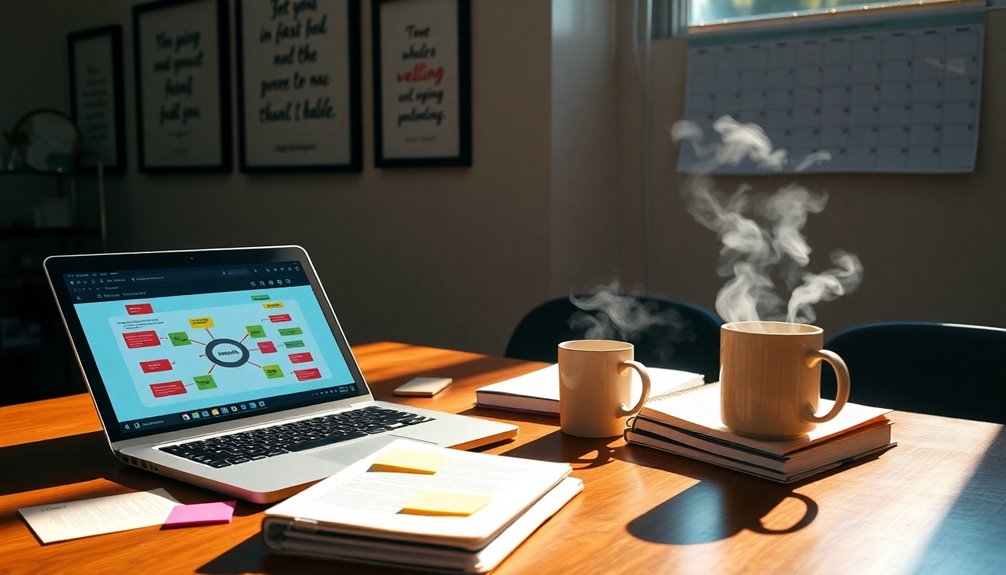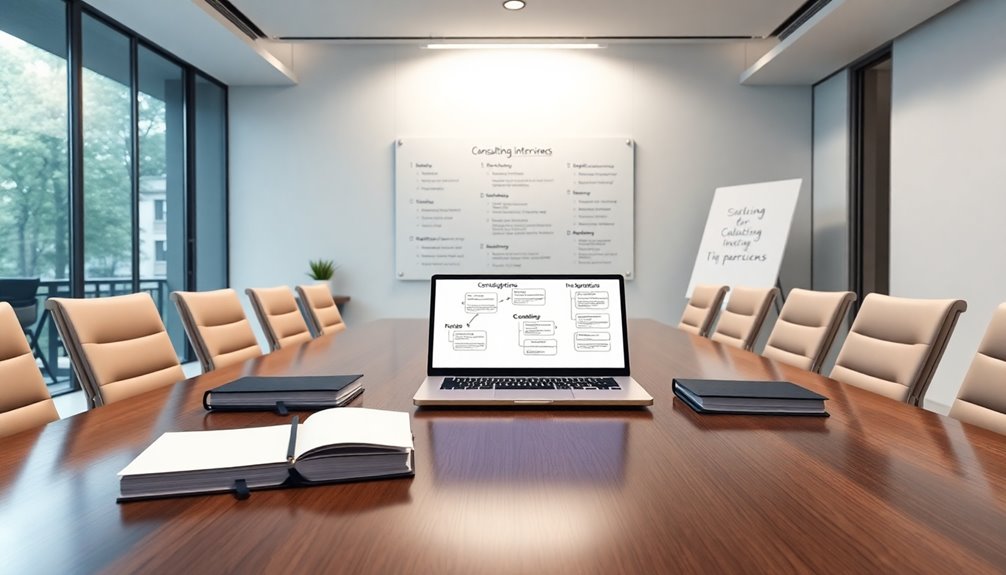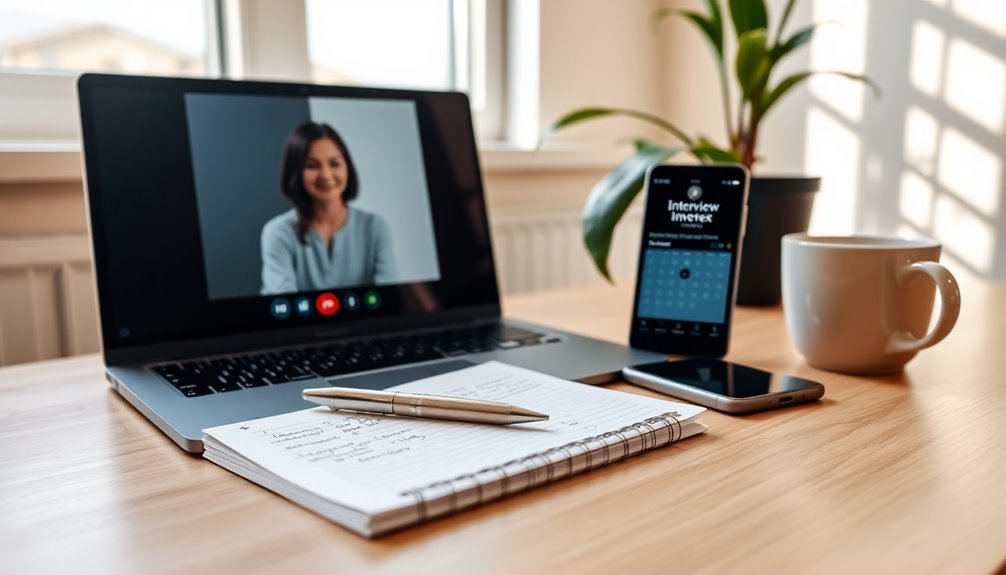To ace your phone interview, start with thorough preparation. Research the company's values and recent news to tailor your responses effectively. Confirm the interview details—date, time, and format—to avoid any last-minute mishaps. During the call, practice active listening; focus on the interviewer's words and ask relevant follow-up questions to show your engagement. Convey enthusiasm about the role and demonstrate your qualifications clearly. Remember, the interviewer's impression of you begins with your professionalism and communication skills. Stick around to uncover more insights that can boost your chances even further.
Key Takeaways
- Thoroughly research the company's values and recent news to tailor your responses effectively.
- Prepare for common interview questions and practice articulating your skills and experiences.
- Confirm interview details, including time, date, and platform, to ensure punctuality and professionalism.
- Utilize active listening techniques, such as paraphrasing and asking follow-up questions, to engage with the interviewer.
- Create a comfortable interview environment free from distractions to enhance focus and clarity during the conversation.
Overview of Phone Interviews

Maneuvering the phone interview process can be a pivotal step in your job search. Typically, your initial phone screen involves a recruiter who assesses your background, skills, and culture fit.
This conversation usually lasts around 30 minutes, giving you a chance to showcase your qualifications and express why the job appeals to you. If you succeed, you may advance to a more in-depth interview with the hiring manager.
It's crucial to be prepared for both types of interviews, as they serve different purposes. By understanding the structure and goals of each stage, you can position yourself effectively, making a strong impression that could lead to the next steps in the hiring process.
Importance of Preparation
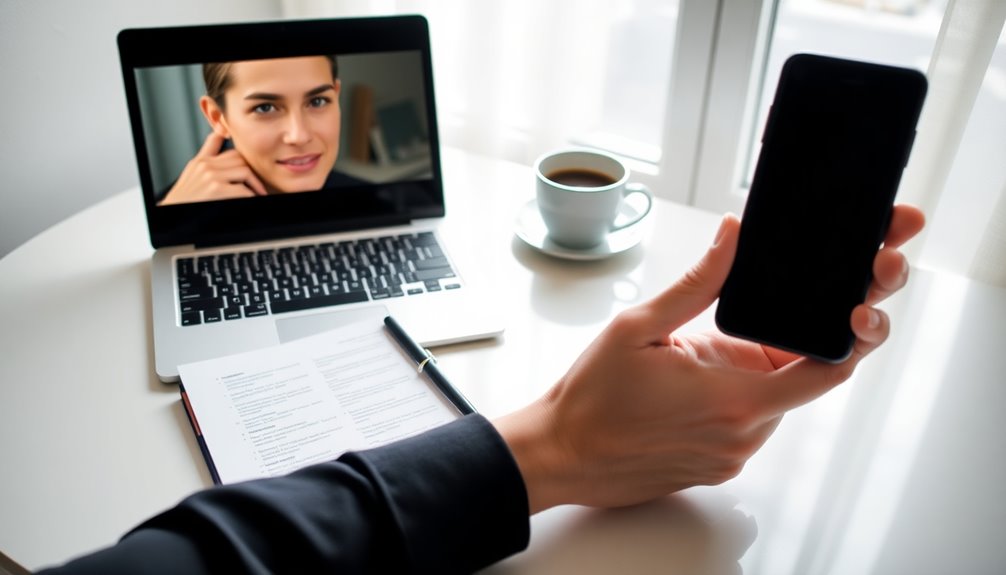
Preparation can make or break your success in a phone interview. When you invest time in getting ready, you set yourself up for a smoother experience and a stronger performance. A candidate who understands the importance of goal-setting can significantly enhance their interview preparation by focusing on key points they want to convey.
A well-prepared candidate can effectively articulate their skills and qualifications, making a lasting impression on the interviewer. It also helps you understand the expectations of the role, allowing you to tailor your responses accordingly.
In addition, preparation can greatly reduce interview anxiety, giving you the confidence to engage in the conversation. Remember, the initial phone interview often determines whether you advance in the hiring process, so take the time to gather your thoughts, practice your answers, and organize your materials.
Your effort will pay off! Furthermore, demonstrating strong communication skills can enhance clarity and build rapport with the interviewer.
Researching the Company

When you're gearing up for a phone interview, researching the company and the role is essential for making a strong impression. Knowing the company's values, recent news, and culture not only demonstrates your interest but also helps you tailor your responses effectively. Here's a quick guide to help you focus your research:
| Focus Area | Action Item | Purpose |
|---|---|---|
| Company Values | Review website and social media | Understand what the company stands for |
| Recent News | Check news articles | Mention relevant updates during the call |
| Job Description | Analyze key responsibilities | Align your skills with the role |
| Culture | Look for employee testimonials | Gauge if you're a culture add or fit |
With this knowledge, you'll be better prepared to make an impactful connection during your interview.
Confirming Interview Details
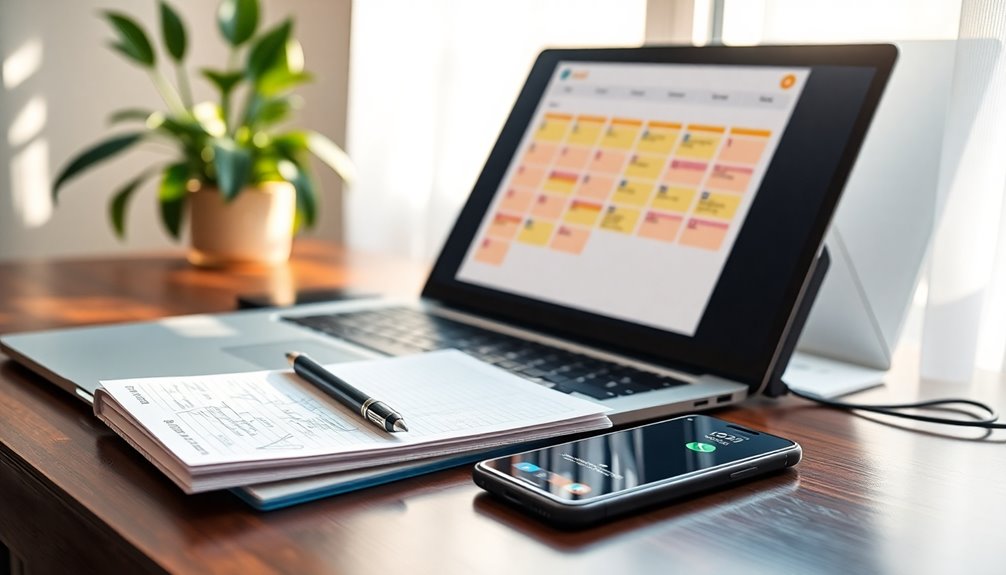
Confirming the details of your phone interview is essential for ensuring everything goes smoothly. Start by double-checking the date and time, and make sure you're aware of any time zone differences.
Set calendar reminders to avoid confusion, and if you can't make the original time, be honest and suggest alternate options. Punctuality is vital; it creates a great first impression.
Also, confirm the interview format and any specific platform you'll be using, like phone or video. Make a note of the interviewer's name and your contact details to have on hand.
Taking these small steps will help you feel more prepared and confident, allowing you to focus on showcasing your skills during the interview.
Knowing Your Interviewer

Understanding who your interviewer is can greatly enhance your phone interview experience. Knowing whether you're speaking with a recruiter or a hiring manager helps you tailor your responses. Recruiters usually focus on qualifications and fit, while hiring managers explore role-specific questions. Researching the interviewer's background can also be beneficial; it allows you to align your answers with their interests and experiences.
| Interviewer Type | Focus Area |
|---|---|
| Recruiter | General qualifications & fit |
| Hiring Manager | Role-specific skills & details |
| Both | Company culture & values |
Active Listening Techniques
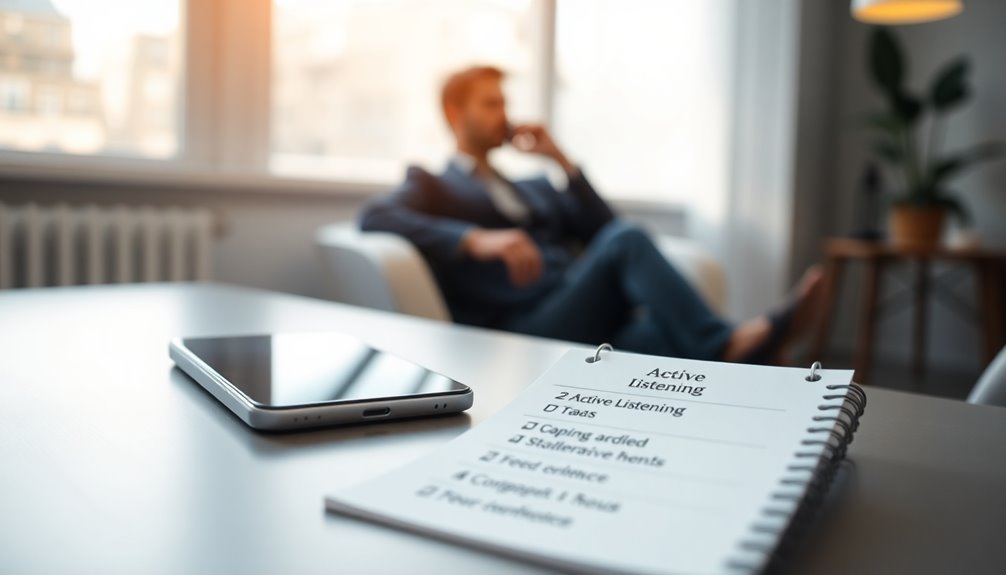
Active listening techniques are essential for making a strong impression during your phone interview. To engage effectively, focus entirely on the interviewer's words.
Avoid interrupting; instead, let them finish before you respond. Paraphrase or summarize their points to show you're paying attention. For instance, you might say, "If I understand correctly, you're looking for someone who can manage projects efficiently." This not only confirms your understanding but also gives you a chance to align your skills with their needs.
Ask relevant follow-up questions based on their answers to demonstrate your interest and engagement. Remember, active listening isn't just about hearing; it's about understanding and responding thoughtfully, which can set you apart from other candidates.
Professionalism in Communication

Effective communication during a phone interview is essential to making a lasting impression. You should use respectful language and maintain a friendly yet professional tone. Taking your time to articulate your thoughts clearly showcases your professionalism. Avoid casual language or slang, as it can diminish your credibility.
| Communication Aspect | Importance | Tips |
|---|---|---|
| Language | Sets a professional tone | Use polite expressions |
| Tone | Conveys attitude | Smile while speaking |
| Clarity | Enhances understanding | Speak slowly and clearly |
| Engagement | Shows interest | Ask relevant questions |
Conveying Enthusiasm

Enthusiasm can be a game-changer during a phone interview, as it sets a positive tone and engages the interviewer. When you convey genuine excitement about the position, it not only helps you stand out but also creates a friendly atmosphere.
Here's how you can express your enthusiasm:
- Smile while you speak; it naturally lifts your tone.
- Use energetic language to describe your experiences.
- Share specific reasons why you're excited about the role.
- Ask engaging questions that show your interest in the company.
Frequently Asked Questions
What Should I Wear for a Phone Interview?
For a phone interview, you don't need to worry about your outfit as much as you'd for an in-person interview, but looking professional can boost your confidence.
Wear something that makes you feel good, like a nice shirt or blouse. Even if the interviewer can't see you, dressing up can positively influence your mindset.
Just make sure you're comfortable and ready to focus on the conversation.
How Can I Handle Technical Issues During the Call?
If you encounter technical issues during your call, stay calm and focused.
First, check your connection and restart your device if needed. If that doesn't work, politely inform the interviewer about the problem and suggest rescheduling.
Always have a backup plan, like using another phone or joining the call via a different method.
Clear communication shows professionalism and keeps the conversation on track, even when unexpected challenges arise.
What if I Don't Know the Answer to a Question?
If you find yourself facing a perplexing question, don't panic!
Pause, breathe, and think through your response. It's perfectly okay to admit you're unsure.
You could say, "That's an interesting question; I haven't encountered that before, but I'd love to explore it further."
This approach shows your willingness to learn and your ability to maintain composure under pressure.
Should I Take Notes During the Interview?
Yes, you should take notes during the interview. Jotting down key points helps you stay organized and focused on important topics.
It also allows you to refer back to specific details when responding to questions. Just make sure your note-taking doesn't distract you from the conversation.
Keep your notes concise, highlighting your qualifications and questions. This approach shows your engagement and helps you remember essential information for follow-up discussions.
How Can I Follow up Effectively After the Interview?
After your interview with a tech startup, you felt confident about your fit.
To follow up effectively, send a thank-you email within 24 hours. In your message, express gratitude for their time and reiterate your excitement about the role.
Mention a specific topic you discussed, like their innovative product line, to personalize it. This shows genuine interest and keeps you fresh in their minds as they make their decision.
Conclusion
As you step into the world of phone interviews, think of yourself as a skilled sailor maneuvering uncharted waters. With the right preparation and confidence, you can steer your conversation toward success. Remember, each answer is a wave you can ride to showcase your skills and enthusiasm. Embrace the opportunity, engage actively, and let your passion for the role shine through. By following these expert tips, you'll be well on your way to making a lasting impression.

